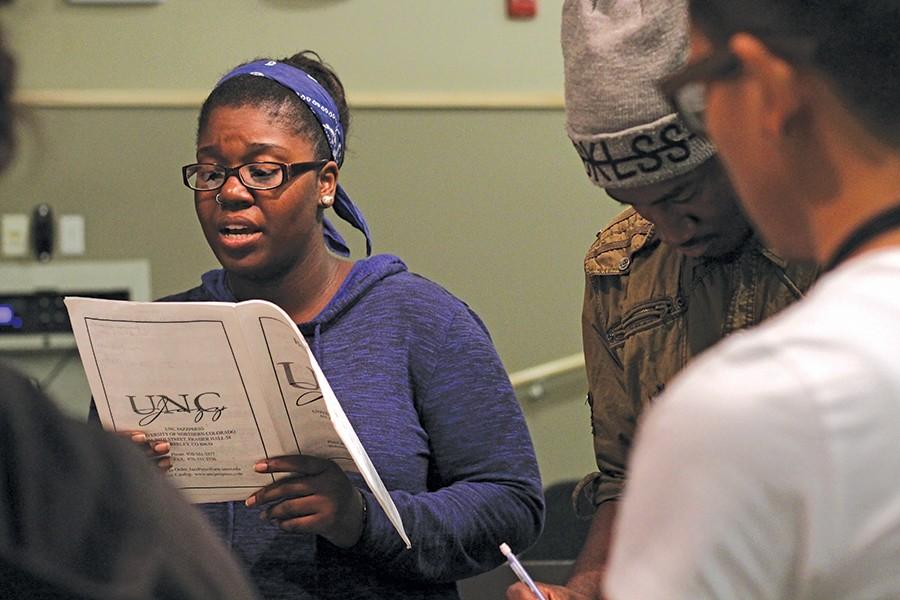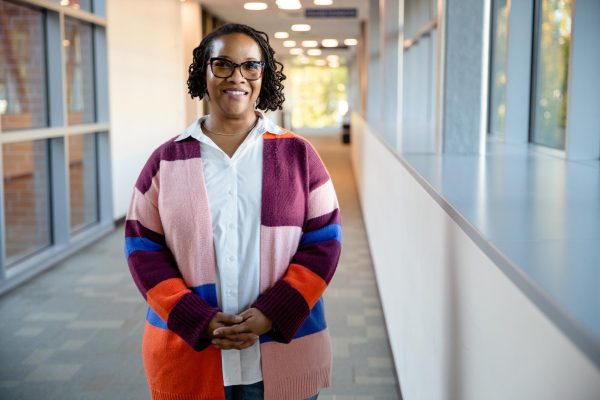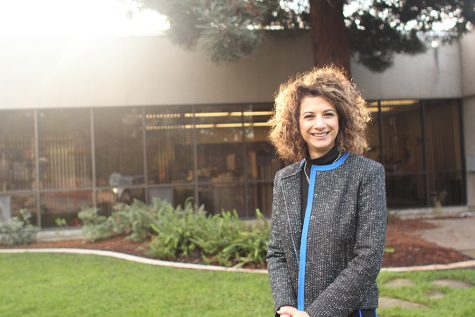Vocal resonance aims to dazzle
Intimate musical selections yield stylistic variety to seasonal showcase
Christian Urrutia / The Advocate
Music major Savannah Cofield-Bey (left) rehearses with the Jazzanova performance group on Monday in M-116.
December 9, 2015
Bonded together through musical notes and chords, vocal jazz choirs Jazzology, Jazzanova and Chamber prepare to end the semester with strong vocal cords during their final performances.
“We share music because it brings people together. We have a very diverse department with a close knit group of people,” music professor Stephanie Austin said.
While preparing their ensembles and “songlets,” the music majors maintain themselves in M-116 or in the piano lab with 8 a.m. rehearsals.
To end the semester, there will be a vocal and piano program student showcase on Dec. 18 at 8 p.m. in the Knox Center.
The showcase “Songs of the Season” will showcase jazz, gospel, songs of the season and “a little bit” of everything, Dr. Austin said.
Music major Chanel Dahdal said music is intimate and every person has a different interpretation of it.
“I love music. It is a main vein,” she said. “I’ve been singing since I could talk.”
Music major Ninoangelo Lastimosa said their job as performers is to make everything look easy and for the audience to enjoy.
The three vocal choirs consisting of music majors have a level of skill required. Jazzology consists of a more “redefining and proficient” stance and instrument usage and rehearsing separate, Dahdal said.
Students have to audition to be part of chamber, she said.
This semester Jazzanova formed with all new people and have been working on recruiting members through promoting themselves during local events or through fliers.
Dahal said, one of the challenges faced this semester is having to raise funds on their own. “The school doesn’t count music as a transferable requirement.”
Austin said, “We don’t have a budget to operate.
“The money from the music department is shared throughout the whole department and we receive a small, small, small portion of it,” she said.
Oftentimes funds are gathered through ticket sales and students are required to sell $200 worth of tickets during the semester as part of their grade, Dahdal said.
Ticket sales are aimed toward family members, friends and anyone in the community willing to support.
Dahdal said they take donations as well.
The jazz groups visit other colleges to perform their and so are sometimes featured due to their likability as a group.
Austin said they will attend the Columbia Jazz Festival during the first weekend of March.
She said they already started rehearsing.
Student performers are set on a high pedestal once completing the basic courses of beginning group voice (MUSIC 170).
There are four levels to the group voice, Lastimosa said. Once past level two, it is expected to be able to read notes.
When practicing in their recording room they have their music books opened hitting note for note.
Lastimosa said, “What inspires me to do music is my family. We used to jam together.”
He said prior to his performance he still feels his fingers shake with nerves but once he is in performance mode he tunes the world out. “I try to be a cool cucumber when I perform,” he said.
After dedicating countless hours of intense practice to prepare for their performances in Lastimosa said being asked how much time spent practicing is one of the toughest criticism to receive.
Students learn proper breathing techniques, tone placement and how to read notes, Dahdal said.
Austin plays a crucial role for the performers as a source of discipline. The bar is set high during rehearsals.
The countless hours spent practicing inside the soundproof rooms in the Music Building allows students to notice their improvements.
They have the chance to sing for each other and give constructive criticism.
“Everyone has an opinion on how music should sound like,” Dahdal said. “We learn how to metabolize criticism, and it is humbling because you can’t have any kind of plan when you come into this program.”













